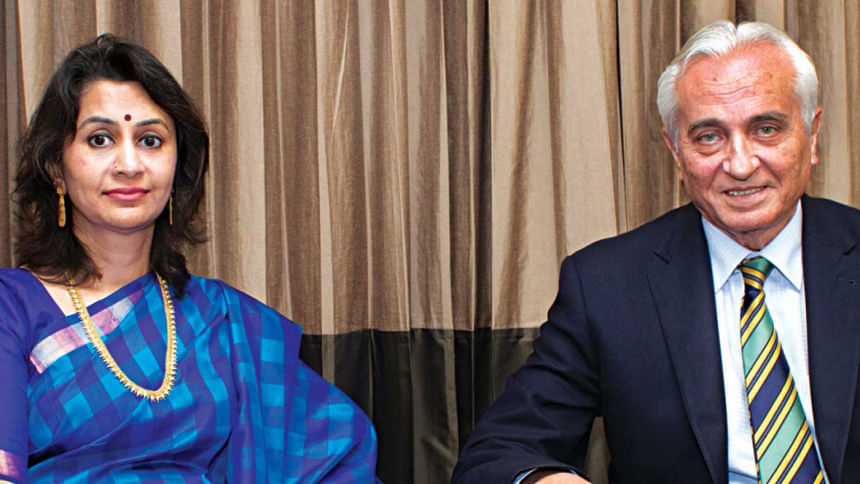Pioneering innovation in the field of education

Imagine a trekking club, several football fields, a basketball gym, a couple of tennis courts, rooms full of futuristic smart-boards, and a number of clean, comfortable living quarters to share with your friends – sounds like a dream, right? Well that's exactly what Indus International School aimed to do: create the perfect environment for their students to nurture their talents, while fostering their individual needs. "In Omnia Paratus!" (Prepared for all challenges) – the excited Lt. General (Retired) Arjun Ray, PVSM, VSM declared. Ray and other founders together excelled IIS to the list of top ranking international schools in India, establishing their unique take on education in the process. In their efforts to pioneer holistic education in the subcontinent, the founders have arranged seminars on IIS' schooling system in Bangladesh. During an interview, SHOUT learnt about IIS, its philosophy and how it stands out from other institutions in the traditional education system.
When asked what motives led to this exceptional venture, Ray said, "At some point in life, people must give back to their community – not from a profit-motive perspective but from a purely altruistic one." Spanning expansive campuses in the regions of Hyderabad, Pune, and Bangalore, IIS' vision has been to create tomorrow's leaders through a holistic education system, which prioritises not only academic excellence but also creative development.
The school's academic curriculum offers three main programs – the IB Primary Years Program (IBPYP), IGCSE, and IB Diploma Program (IBDP). The IBPYP is for young learners from kindergarten to grade 5; the IGCSE is implemented for the students of grades 9 and 10; the IBDP, for grades 11 and 12. While students are encouraged to work using laptops, the classrooms are equipped with interactive whiteboards, also known as smart-boards. Subjects such as biotechnology, graphics, internet, ecology, entrepreneurship and bio-diversity form a pivotal part of the syllabus. We were particularly interested to find out how the Indus authorities tackled an obvious problem – finding smart, creative faculty to match their innovative schooling system. As expected, the founders agreed that this was a major obstacle. "The difficult part was finding suitable human resource," said Sarojini Rao, Principal of IIS, Bangalore. "As the Indian education system emphasises primarily on mathematics and science, we had to implement extensive training programs to get faculties to think laterally – to step out of the box."
Although students were surprisingly receptive to the three programs, parents were hesitant to accept what was far from their traditional understanding of a promising education system. The authorities had planned to tackle this as well. Rao added, "We wanted to convince the parents that a purely academic focus isn't enough for a child to succeed in life. In order to do this, we established the Parents Advisory Committee (PAC) which engages parents extensively into all our programs."
Just when we thought that things couldn't get any more novel, Sarojini Rao declared that they had an entire school devoted to teaching leadership. The Indus School of Leadership (ISL) aims to hone the inner 'leader' in every student through various community-centric initiatives. The Indus International Community School (IICS) project, undertaken to provide equal-opportunity educational facilities to rural, underprivileged children, defines Indus' mission to give back to the people.
Indus houses students from numerous nationalities. When asked about IIS' Bangladeshi students, Arjun Ray spoke fondly: "The Head Girl of IIS, Hyderabad, is from Dhaka. Our Bangladeshi students are extremely bright and they have excelled in every field."
The founders have plans to expand outside India and could establish a school in Dhaka very soon. In the near future, IIS plans to introduce 'Emerging Sciences', a combination of nanotechnology, quantum physics, robotics and genomics, into their already diverse curriculum. There are numerous projects in the pipeline, some of which include the establishment of more teacher-development centres in cities in and out of India, including Dhaka.
Indus' dedication to constant innovation and improvement is what truly distinguishes this school from others of its kind. In founder Arjun Ray's words, "The traditional education system prepares individuals for jobs. They define success by how much money we make. At Indus, we believe that the purpose of education is to make a difference. Preparation for life is our objective."

 For all latest news, follow The Daily Star's Google News channel.
For all latest news, follow The Daily Star's Google News channel. 



Comments